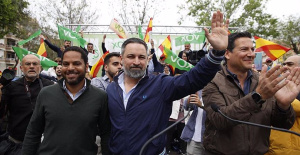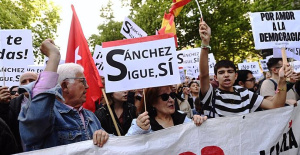His defense criticizes what he considers a decision "not only harmful" for the former head of ETA, but also "against the law"
MADRID, 21 Nov. (EUROPA PRESS) -
The former head of ETA Ignacio Miguel Gracia, alias 'Iñaki de Rentería', has appealed the decision of the National Court judge to reopen the investigation for him for his alleged involvement in the kidnapping and murder of PP councilor Miguel Ángel Blanco, alleging that the magistrate made a decision "against the law" as the facts would be prescribed.
In a letter addressed to the Criminal Chamber, to which Europa Press has had access, the defense of 'Iñaki de Rentería' asks to revoke the order issued by the head of the Central Court of Instruction Number 6, Manuel García Castellón, in which agreed to reopen the case for the former head of the band. In it, however, the instructor ruled out ruling on whether the case as a whole had expired, explaining that it was not the time to clarify it.
For Gracia's representation, however, it is evident that the 20 years provided for the prescription of these facts would have "exceeded with a vengeance." And this is so insofar as "the facts that the complaint attributes to him occur in 1997 and the procedure is not directed against him until the complaint is filed by the Dignity and Justice association and the order of admission of the same issued by the court, both in the year 2022".
"Therefore, 24 years have elapsed between the time the events occurred and the admission of the complaint for processing by the Central Court of Instruction Number 6," they explain in their letter, dated last Thursday, criticizing that García Castellón correct the decision that it adopted last July, when it filed the case appreciating the prescription of the crimes.
The magistrate estimated on November 10 the resources of the Prosecutor's Office, the Popular Party and partially that of Dignity and Justice, reopening the investigation for 'Iñaki de Rentería' but postponing the general debate on the prescription. The magistrate left the decision on whether the facts had expired or not in the hands of the Criminal Chamber.
In the opinion of the representation of Gracia, with his resolution the magistrate adopted a decision not only detrimental to the interests of Gracia, but also contrary to law. The defense of the former head of ETA considers "fully in line with the law" the statement that the judge made in July regarding the "prescription of the crime against Gracia, while the one contained in the now appealed order contradicts the rights to legal security and to liberty and the principle of legality".
In his order, García Castellón fully assumed "the mollar arguments" on which the appeal for reform filed by the Public Ministry was based: "Mr. Gracia Arregui has not yet been prosecuted in this case and the statute of limitations applies to prosecuted individuals".
The prosecutor Vicente González Mota stated in the aforementioned appeal that the file for 'De Rentería' should be revoked, arguing that "agreeing on the resolution of dismissal, with the consequences that it entails, comparable to that of an acquittal", was not "appropriate in this moment".
However, the defense of the former head of ETA argues that the Supreme Court "has said that" the prescription "can be proclaimed at any stage of the procedure in which the concurrence of the requirements that define and condition it is clearly manifested."
In this context, the representation of 'Iñaki de Rentería' emphasizes that in this case "not only is no evidence necessary to prove the concurrence of the assumption of the passage of time provided for by the norm between the facts and the moment in which the procedure is directed against Arregui, but this is not questioned either by the Public Prosecutor's Office in the appeal that the Court is now accepting, nor by it in its order that reforms its previous order".
His defense criticizes "the argument that the Court maintains in the appealed order that the declaration of the prescription at this moment could have pernicious effects in terms of the development of the investigation", and that "it would produce a kind of acquittal with propagating effects in the other defendants".
"The investigating judge does not specify the reasons on which he bases these thick statements. But in any case, what is clear is that none of them would be above the right that Mr. Gracia has to have the crime declared prescribed in his case and with This extinguished any possible criminal responsibility, in addition to the fact that this declaration would obviously have no effect on his right to defense, as the jurisprudence has clearly established," the letter states.
In it, his defense also warns that there would be "no foundation or justification whatsoever for taking a statement" from Gracia "on the facts, since it could only deal with eventual authorship." "An eventual authorship of someone, I insist, who cannot be declared criminally responsible", they explain.
García Castellón reopened the case in March after admitting a complaint from the victims' association that also seeks to condemn those who formed the executive committee of ETA or Zuba when the crime was committed.
At the request of the instructor, the Civil Guard has already issued a report in which it holds the former ETA leaders responsible for the death of the young PP councilor in Ermua because it considers that an order from them could have prevented it.
It should be remembered that, in the case of the murder of Blanco, the First Criminal Section of the National Court already sentenced the former ETA leader Francisco Javier García Gaztelu, 'Txapote', to 50 years in prison in 2006, and his sentimental partner and member of ETA Irantzu Gallastegui Sodupe, 'Amaia', as material authors.
In its ruling, the court stated that both "planned and carried out the kidnapping and subsequent murder of Miguel Ángel Blanco, following the guidelines of the leadership of the terrorist organization ETA, whose most immediate objectives were the kidnapping of a PP councilor to demand, in exchange for their release, the bringing of the gang's prisoners to prisons in the Basque Country".

 Exploring Cardano: Inner Workings and Advantages of this Cryptocurrency
Exploring Cardano: Inner Workings and Advantages of this Cryptocurrency Seville.- Economy.- Innova.- STSA inaugurates its new painting and sealing hangar in San Pablo, for 18 million
Seville.- Economy.- Innova.- STSA inaugurates its new painting and sealing hangar in San Pablo, for 18 million Innova.- More than 300 volunteers join the Andalucía Compromiso Digital network in one month to facilitate access to ICT
Innova.- More than 300 volunteers join the Andalucía Compromiso Digital network in one month to facilitate access to ICT Innova.-AMP.- Ayesa acquires 51% of Sadiel, which will create new technological engineering products and expand markets
Innova.-AMP.- Ayesa acquires 51% of Sadiel, which will create new technological engineering products and expand markets Abascal (Vox) criticizes that Sánchez is "victimizing" himself and calls for elections after his possible resignation
Abascal (Vox) criticizes that Sánchez is "victimizing" himself and calls for elections after his possible resignation Carlos Alcaraz reaches the round of 16 in Madrid without breaking a sweat
Carlos Alcaraz reaches the round of 16 in Madrid without breaking a sweat Some 5,000 people demonstrate in front of Congress for democracy, hours before Sánchez's decision
Some 5,000 people demonstrate in front of Congress for democracy, hours before Sánchez's decision STATEMENT: Intelligent systems used in the construction of the deepest underwater tunnel in China
STATEMENT: Intelligent systems used in the construction of the deepest underwater tunnel in China How Blockchain in being used to shape the future
How Blockchain in being used to shape the future Not just BTC and ETH: Here Are Some More Interesting Coins Worth Focusing on
Not just BTC and ETH: Here Are Some More Interesting Coins Worth Focusing on UPV students build a prototype of a wooden house to move to Equatorial Guinea
UPV students build a prototype of a wooden house to move to Equatorial Guinea The UA opens the call for the Impulso 2024 Awards for the best innovative business initiatives
The UA opens the call for the Impulso 2024 Awards for the best innovative business initiatives ALI, virtual assistant from Alicante, internationally recognized by the OECD
ALI, virtual assistant from Alicante, internationally recognized by the OECD Retrópolis brings the golden age of video games and computing to the UPV
Retrópolis brings the golden age of video games and computing to the UPV A million people demonstrate in France against Macron's pension reform
A million people demonstrate in France against Macron's pension reform Russia launches several missiles against "critical infrastructure" in the city of Zaporizhia
Russia launches several missiles against "critical infrastructure" in the city of Zaporizhia A "procession" remembers the dead of the Calabria shipwreck as bodies continue to wash up on the shore
A "procession" remembers the dead of the Calabria shipwreck as bodies continue to wash up on the shore Prison sentences handed down for three prominent Hong Kong pro-democracy activists
Prison sentences handed down for three prominent Hong Kong pro-democracy activists ETH continues to leave trading platforms, Ethereum balance on exchanges lowest in 3 years
ETH continues to leave trading platforms, Ethereum balance on exchanges lowest in 3 years Investors invest $450 million in Consensys, Ethereum incubator now valued at $7 billion
Investors invest $450 million in Consensys, Ethereum incubator now valued at $7 billion Alchemy Integrates Ethereum L2 Product Starknet to Enhance Web3 Scalability at a Price 100x Lower Than L1 Fees
Alchemy Integrates Ethereum L2 Product Starknet to Enhance Web3 Scalability at a Price 100x Lower Than L1 Fees Mining Report: Bitcoin's Electricity Consumption Declines by 25% in Q1 2022
Mining Report: Bitcoin's Electricity Consumption Declines by 25% in Q1 2022 Oil-to-Bitcoin Mining Firm Crusoe Energy Systems Raised $505 Million
Oil-to-Bitcoin Mining Firm Crusoe Energy Systems Raised $505 Million Microbt reveals the latest Bitcoin mining rigs -- Machines produce up to 126 TH/s with custom 5nm chip design
Microbt reveals the latest Bitcoin mining rigs -- Machines produce up to 126 TH/s with custom 5nm chip design Bitcoin's Mining Difficulty Hits a Lifetime High, With More Than 90% of BTC Supply Issued
Bitcoin's Mining Difficulty Hits a Lifetime High, With More Than 90% of BTC Supply Issued The Biggest Movers are Near, EOS, and RUNE during Friday's Selloff
The Biggest Movers are Near, EOS, and RUNE during Friday's Selloff Global Markets Spooked by a Hawkish Fed and Covid, Stocks and Crypto Gain After Musk Buys Twitter
Global Markets Spooked by a Hawkish Fed and Covid, Stocks and Crypto Gain After Musk Buys Twitter Bitso to offset carbon emissions from the Trading Platform's ERC20, ETH, and BTC Transactions
Bitso to offset carbon emissions from the Trading Platform's ERC20, ETH, and BTC Transactions Draftkings Announces 2022 College Hoops NFT Selection for March Madness
Draftkings Announces 2022 College Hoops NFT Selection for March Madness



























